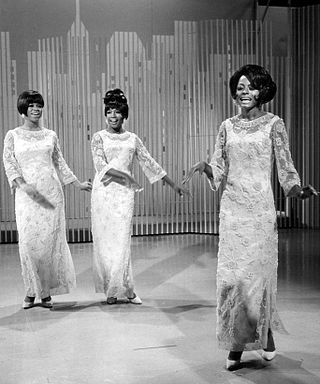
The Supremes were an American girl group and a premier act of Motown Records during the 1960s. Founded as the Primettes in Detroit, Michigan, in 1959, the Supremes were the most commercially successful of Motown's acts and the most successful American vocal band, with 12 number-one singles on the Billboard Hot 100. Most of these hits were written and produced by Motown's main songwriting and production team, Holland–Dozier–Holland. It is said that their breakthrough made it possible for future African-American R&B and soul musicians to find mainstream success. Billboard ranked the Supremes as the 16th greatest Hot 100 artist of all time.

Cynthia Ann Birdsong is an American singer who became famous as a member of The Supremes in 1967, when she replaced co-founding member Florence Ballard. Birdsong had previously been a member of Patti LaBelle & The Bluebelles.
Velma Jean Terrell is an American R&B and jazz singer. She replaced Diana Ross as the lead singer of The Supremes in 1970.

American girl group The Supremes have released 29 studio albums, four live albums, two soundtrack albums, 32 compilation albums, four box sets, 66 singles and three promotional singles. The Supremes are the most successful American group of all time, and the 26th greatest artist of all time on the US Billboard charts; with 12 number-one songs on the Billboard Hot 100 and three number-one albums on the Billboard 200. The Supremes were the first artist to accumulate five consecutive number-one singles on the US Hot 100 and the first female group to top the Billboard 200 albums chart with The Supremes A' Go-Go (1966). In 2017, Billboard ranked The Supremes as the number-one girl group of all time, publishing, 'although there have been many girl group smashes in the decades since the Supremes ruled the Billboard charts, no collective has yet to challenge their, for lack of a better word, supremacy.' In 2019, the UK Official Charts Company placed 7 Supremes songs—"You Can't Hurry Love" (16), "Baby Love" (23), "Stop! In the Name of Love" (56), "Where Did Our Love Go?" (59), "You Keep Me Hangin' On" (78), "Come See About Me" (94) and "Stoned Love" (99)—on The Official Top 100 Motown songs of the Millennium chart, which ranks Motown releases by their all-time UK downloads and streams.

Farewell is a 1970 live album by Diana Ross & the Supremes. The album was recorded over the course of the group's final engagement together at the New Frontier Hotel and Casino in Las Vegas, Nevada, including the final night on January 14, 1970. The show marked Diana Ross' penultimate performance with fellow Supremes members Mary Wilson and Cindy Birdsong. At the conclusion of the show, new Supremes lead singer Jean Terrell was brought onstage and introduced to the audience.

Let The Sunshine In is the sixteenth studio album by Diana Ross & the Supremes recorded and released by Motown in 1969. It contains the hit single "I'm Livin' in Shame", "The Composer," a Smokey Robinson composition that peaked at number 27, and "No Matter What Sign You Are," - a single produced by Motown chief Berry Gordy that failed to crack to Top 30. Motown had titled the album “No Matter What Sign You Are” originally; going as far as creating the front cover art with the title in it, but when the single didn’t chart as expected the album was retitled “Let The Sunshine In.” Though the album was released when the group consisted of Diana Ross, Mary Wilson and Cindy Birdsong, original founding member Florence Ballard appears on two songs.

"The Tracks of My Tears" is a song written by Smokey Robinson, Pete Moore, and Marv Tarplin. It is a multiple award-winning 1965 hit R&B song originally recorded by their group, The Miracles, on Motown's Tamla label. The Miracles' million-selling original version has been inducted into The Grammy Hall of Fame, has been ranked by the Recording Industry Association of America and The National Endowment for the Arts at No. 127 in its list of the "Songs of the Century" – the 365 Greatest Songs of the 20th Century, and has been selected by Rolling Stone as No. 50 on its list of "The 500 Greatest Songs of All Time", among many other awards. In 2021, Rolling Stone ranked the Miracles' original recording of "The Tracks of My Tears" as "The Greatest Motown Song of All Time".
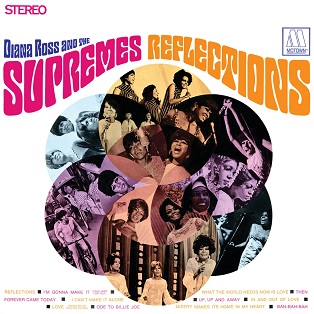
Reflections is the twelfth studio album recorded for Motown by Diana Ross & the Supremes. Released in 1968, it was the first regular studio LP to display the new billing of the group formerly known as "The Supremes." It contains the singles "Reflections", "In and Out of Love" and "Forever Came Today". Also included are covers of songs made famous by Martha and the Vandellas and The 5th Dimension. Also present are songs written by other famous names, including "Bah-Bah-Bah" co-written by Motown singer Brenda Holloway with her younger sister, Patrice, an original Smokey Robinson composition titled "Then", and "What the World Needs Now Is Love" by Burt Bacharach and Hal David, which Motown planned to release as a single in the spring of 1968, but cancelled. It also contains a cover of Bobbie Gentry's "Ode to Billie Joe," whose original recording kept the single #2 "Reflections" from peaking at the top spot on the Billboard Hot 100 in September 1967, and it hit #2 on Cashbox.
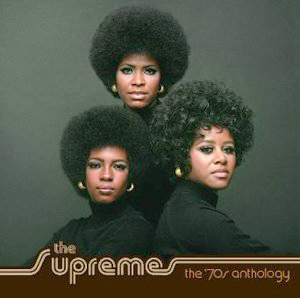
The '70s Anthology is a 2002 two compact disc set of many of the songs recorded by the 1970s groupings of The Supremes. The set features 42 tracks, of which 10 had never been released, and 6 were appearing in extended or unedited forms.

"I Second That Emotion" is a 1967 song written by Smokey Robinson and Al Cleveland. First charting as a hit for Smokey Robinson and the Miracles on the Tamla/Motown label in 1967, "I Second That Emotion" was later a hit single for the group duet Diana Ross & the Supremes and the Temptations, also on the Motown label.

Greatest Hits, Vol. 2 is the second greatest hits album for The Miracles, released in 1968 on Motown Records' Tamla label. It contained the most popular singles from the successful Going to a Go-Go, Away We A Go-Go and Make It Happen albums of the 1965–1967 period. It also featured the 1964 non-album single "Come On Do The Jerk", and two B-sides, "Choosey Beggar" and "Save Me". The hit single "I Second That Emotion" was new to the album. This album reached the Top 10 on the Billboard 200 albums chart, peaking at #7, and peaked at #2 on Billboard's R&B album chart. Ten of the albums' 12 songs were written by Miracles members Smokey Robinson, Pete Moore, Marv Tarplin, Bobby Rogers, and Ronnie White.

"Floy Joy" is a song written by Smokey Robinson and released as a single in December 1971 by popular Motown female singing group The Supremes.

"Automatically Sunshine" is a song written by Smokey Robinson and released as a single by Motown singing group The Supremes as the second single from their popular album Floy Joy in 1972.
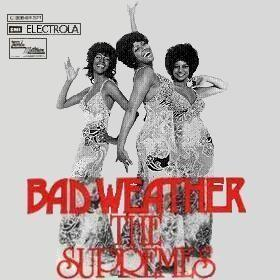
"Bad Weather" is a song recorded and released as a single by Motown vocal group The Supremes in 1973. It was composed by Stevie Wonder and Lynda Laurence's brother Ira Tucker Jr., and produced by Wonder. The song was Jean Terrell's last charted single as lead singer of the Supremes and the second and last time Laurence was featured on a Supremes single.
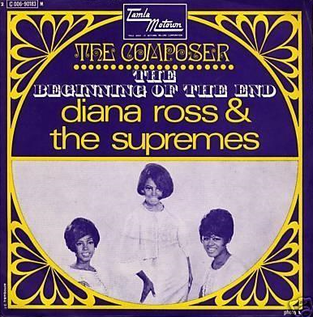
"The Composer" is a 1969 song released for Diana Ross & the Supremes by the Motown label.

"I'll Try Something New" is a song written by Smokey Robinson and originally released in 1962 by The Miracles on Motown Records' Tamla subsidiary label. Their version was a Billboard Top 40 hit, peaking at #39, and just missed the Top 10 of its R&B chart, peaking at #11. The song was released later as a joint single by Diana Ross & the Supremes and The Temptations, also becoming a charting version on the Billboard 100 pop singles chart, peaking for two weeks in April 1969 at number 25.
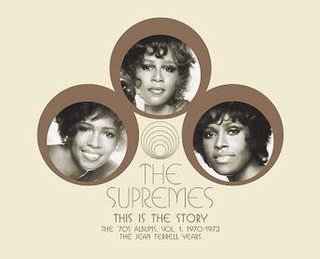
This Is The Story is a box set, released in 2006, comprising The Supremes' albums from the period 1970-1973, featuring new lead singer Jean Terrell, along with Mary Wilson, Cindy Birdsong and Lynda Laurence In addition to the five studio albums Right On, New Ways But Love Stays, Touch, Floy Joy, and The Supremes Produced and Arranged by Jimmy Webb, the set also includes thirteen tracks from the group's unreleased 1972 album, Promises Kept. Not included from the same time period are the three duet albums recorded with Four Tops; these were issued in full in 2009 on the 2-CD compilation Magnificent - The Complete Studio Duets, which included 13 previously unreleased recordings.
"Point It Out" is a 1969 recording by Motown Records R&B group The Miracles on that label's Tamla subsidiary. This mid-tempo song was a national Billboard Top 40 Pop hit, reaching #37 on the Hot 100, and was a Top 10 R&B hit was well, reaching #4. It was taken from their album "A Pocket Full Of Miracles", and was written by Miracles members William "Smokey" Robinson and Marv Tarplin, along with Motown staff songwriter Al Cleveland.
We've Come Too Far to End It Now was a 1972 single by Motown Records R&B group The Miracles on its Tamla Label subsidiary (T54220F) and taken from their 1972 album, Flying High Together, the group's final studio album with original lead singer Smokey Robinson. This song charted at #46 on the Billboard Pop Chart, and reached the Top 10 of its R&B chart, peaking at #9.

"Your Wonderful, Sweet Sweet Love" is a song written by Smokey Robinson, recorded in October 1966 by Kim Weston. Her recording was not issued at the time as she left the label over a dispute over royalties in 1967. Weston's original version was first released in 2005.
















